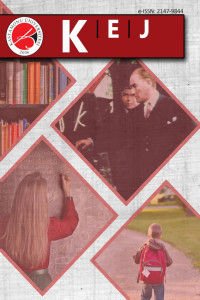Öz
Kaynakça
- Yılmaz, Z., & Karamustafaoğlu, S. (2015). Öğretmen adaylarının sorgulama becerilerinin farklı değişkenler açısından incelenmesi. Dicle Üniversitesi Ziya Gökalp Eğitim Fakültesi Dergisi, 25, 347-363.
- Zengin, Y., Furkan, H., & Kutluca, T. (2012). The effect of dynamic mathematics software GeoGebra on student achievement in teaching of trigonometry. Procedia-Social and Behavioral Sciences, 31, 183-187.
Öz
Purpose: Questioning, discovering, generalizing, verifying, and disproving are fundamental aspects of geometry teaching. As seen, the inquiry is at the geometry’s core. According to this, inquiry learning toward geometry is a student-centered learning process that allows the student to construct geometric information and to create permanent learning by actively using inquiring skills such as hypothesizing, proving, and disproving in the geometry learning process. To see this process in detail, the purpose of this study is to examine middle-schoolers’ levels of inquiry learning skills toward geometry, as well as their relationship to various variables.
Design/Methodology/Approach: In the survey model, 312 middle school students participated in the study. Data were collected using the Inquiry Learning Skills Scale for Geometry and Demographic Information Form.
Findings: It has been determined that middle-schoolers have a high level of inquiry learning skills toward geometry. As a result, inquiry learning skills toward geometry were found to significantly differ by gender, father’s educational status, year-end achievement score, asking questions, using materials in the lesson, and associating geometry with daily life. However, there was no significant difference between these skills and the grade level and mother’s education status.
Highlights: By using concrete abstract materials or models related to daily life in lessons, teachers can attract students’ interest, arouse curiosity in students, and encourage students to use and develop their inquiry learning skills. In addition to educational activities at school, parents can contribute to the development of certain skills such as observation and questioning by creating opportunities for their children to participate in scientific activities at home or in their social environment and exposing them to different stimuli.
Anahtar Kelimeler
Kaynakça
- Yılmaz, Z., & Karamustafaoğlu, S. (2015). Öğretmen adaylarının sorgulama becerilerinin farklı değişkenler açısından incelenmesi. Dicle Üniversitesi Ziya Gökalp Eğitim Fakültesi Dergisi, 25, 347-363.
- Zengin, Y., Furkan, H., & Kutluca, T. (2012). The effect of dynamic mathematics software GeoGebra on student achievement in teaching of trigonometry. Procedia-Social and Behavioral Sciences, 31, 183-187.
Ayrıntılar
| Birincil Dil | İngilizce |
|---|---|
| Konular | Matematik Eğitimi |
| Bölüm | Research Article |
| Yazarlar | |
| Yayımlanma Tarihi | 29 Nisan 2024 |
| Kabul Tarihi | 16 Mart 2024 |
| Yayımlandığı Sayı | Yıl 2024 Cilt: 32 Sayı: 2 |


